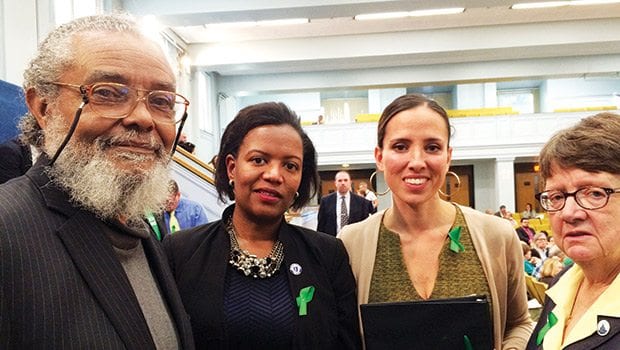Legislators advance profiling bills
Bills would require police to report data on pedestrian stops

The Massachusetts Legislature’s Joint Committee on the Judiciary heard testimony this week on a set of bills addressing racial profiling by police.
The proposed legislation, introduced by Rep. Byron Rushing and Sens. Sonia Chang-Diaz and Linda Dorcena Forry, aims to prohibit racial profiling during motor vehicle and pedestrian stops, and require increased data collection and review to identify racial disparities in policing practices. The law would apply to all state, municipal, college and university law enforcement officers.
“What we’ve seen nationally and locally around demands for police accountability underscores the need for this type of legislation,” said Rahsaan Hall, director of the Racial Justice Program at the American Civil Liberties Union of Massachusetts.
“We can’t manage what we don’t measure,” Hall told the Banner before the hearing. “It’s one thing to say racial profiling is happening based on anecdotal reports, but it’s another to have empirical data. [Data collection helps] to see where there are problems, and also to acknowledge those departments that are getting it right.”
A bill introduced by Dorcena Forry and Rushing addresses traffic stop data in particular; a second bill by Dorcena Forry addresses pedestrian stops; and Chang-Diaz’s is a comprehensive police-civilian encounter bill that covers both traffic and pedestrian stops.
In 2000, the Massachusetts legislature passed a special law requiring state and local police to collect traffic stop data for a 27-month period in order to identify and address race and gender bias. An ACLU fact sheet notes that subsequent analysis of this data made it clear that racial disparities were common, showing that non-white motorists were searched or cited at disproportionate rates.
No further law was enacted when the study period ended, so while State Police continue to collect data, municipalities face no requirement to do so.
“While local police departments seek to embrace policies to increase transparency about their actions, information about police-civilian interactions for Massachusetts, as a whole, is scarce and incomplete,” the three bill sponsors told Judiciary Committee members in a joint testimony statement, distributed at Tuesday’s State House hearing.

Author: Photo courtesy office of Linda Dorcena ForryLinda Dorcena Forry
The proposed legislation makes data collection a consistent requirement statewide. Anytime an individual is “stopped, frisked, or searched” by a law enforcement officer, specific information would have be recorded, including the name and badge number of the officer; the date, time, location and the reason for the stop; the number of occupants of the vehicle, for traffic stops; the race, ethnicity, gender and approximate age of the driver and/or anyone searched during the stop; whether the driver or any person searched has limited English proficiency; whether a frisk or search was instigated; whether any contraband was found or materials seized; and whether the result was a warning, citation, arrest or no action. If there is no arrest or citation, officers must provide a receipt to the stopped person at the conclusion of the stop.
“This receipt element is designed both to cultivate community trust in the department and to enable the individual to document a stop if he or she feels it was made on a discriminatory basis,” the legislators’ statement reads.
Law enforcement departments would be required to review all this data at least quarterly. The Secretary of Public Safety and Security would compile the data into annual reports.
Among those who turned out for the hearing was Donnell Wright, 51, of Springfield, who has been pulled over for “driving while black” some 15 times, he estimates. Officers have asked him if he has drugs or weapons in the car, pulled him out of the car, and questioned his passengers. When he asks why he’s been stopped, the typical answer is simply “License and registration — We’ll tell you afterwards,” he said, speaking to the Banner outside the hearing room.
“It’s a real phenomenon. And it’s putting a wedge between the police and the community,” he added. “That’s one of the reasons people don’t talk [to police] when there’s a crime.”
Uneven reporting
The legislators, in their testimony, noted that even in the absence of a legal mandate, the Massachusetts State Police does practice comprehensive data collection during all traffic stops and regular audits and analysis of the data, along with racial profiling prevention training and policies.
The Boston Police Department also voluntarily collects data on police-pedestrian encounters, the legislators noted. In 2014, under pressure from the ACLU, BPD released several years’ data on pedestrian stops — Field Interrogation, Observation, Frisk, and Search reports, known as FIO or FIOFS reports — to a university researcher.
The ACLU produced a report on the researcher’s findings. Its 2014 “Black, Brown and Targeted” report reveals that blacks, who represent less than 25 percent of the city’s population, accounted for 63 percent of FIOs during the 2007-2010 period, and that the vast majority of stops did not result arrest or in seizure of contraband or a weapon. The report concludes that Boston had “a pattern of racially targeted, police-civilian encounters and a practice of failing to ensure that stops and frisks were justified.”
While police representatives at the time responded that these results reflected old data, and policing has since changed, BPD has not yet complied with the Banner’s Freedom of Information Act request filed a year ago to obtain FIO data from 2010 through late 2014. In August, the ACLU of Massachusetts filed a lawsuit against BPD to release FIO data from 2011 on.






